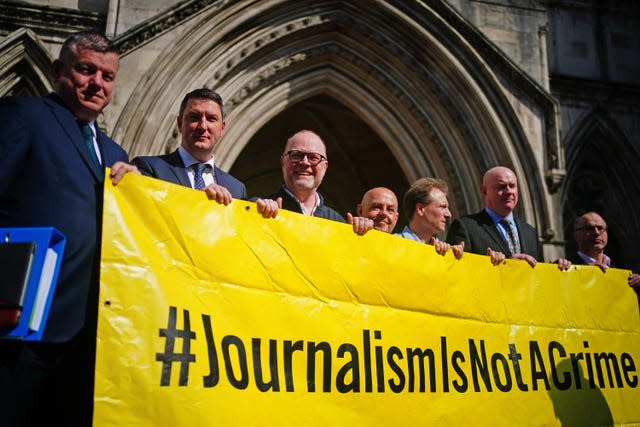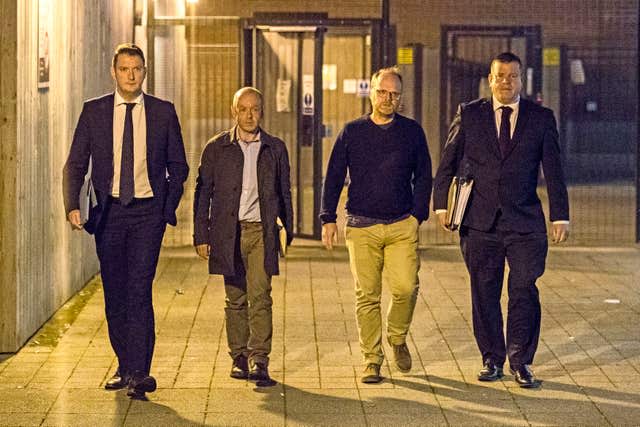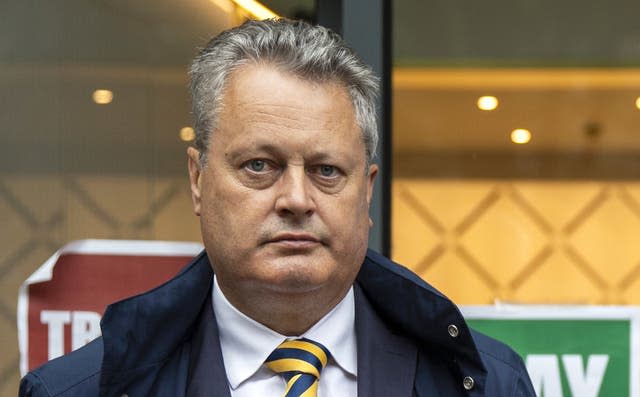Police in Northern Ireland undertook six-monthly trawls of the phone data of “troublemaker” journalists to see if they were in contact with officer sources, a tribunal has heard.
Details of what was described as “Orwellian” PSNI spying tactics on reporters emerged at a sitting of the Investigatory Powers Tribunal (IPT) in London.
The revelations were aired in the latest hearing of a case examining allegations that two investigative reporters in Northern Ireland were subject to unlawful covert intelligence by the police.
Evidence presented to the tribunal on Wednesday suggested that Police Service of Northern Ireland (PSNI) spying operations extended to several other reporters operating in the region.


In 2018, investigative documentary makers Barry McCaffrey and Trevor Birney were controversially arrested as part of a police investigation into the alleged leaking of a confidential document that appeared in a film they made on a Troubles massacre.
The PSNI later unreservedly apologised for how the men had been treated and agreed to pay £875,000 in damages to the journalists and the film company behind the documentary.
In 2019, Mr Birney and Mr McCaffrey lodged a complaint with the IPT asking it to establish whether there had been any unlawful surveillance of them.
The PSNI had asked Durham Constabulary to take the lead in the investigation into the leaked Police Ombudsman of Northern Ireland document that appeared in the documentary, No Stone Unturned, into the 1994 loyalist paramilitary massacre in the village of Loughinisland in Co Down.
Last week, 600 pages of new evidence were disclosed to the tribunal ahead of a substantive hearing scheduled for October.
Those papers included a Durham Constabulary minute of a meeting between the senior investigating officer from Durham, Darren Ellis, and two PSNI detective sergeants working in intelligence operations.
Ben Jaffey KC, representing Mr McCaffrey, revealed that the note made reference to what was described as a PSNI “defensive operation” against journalists in the region.
“It appears to disclose the existence of what the PSNI call a defensive operation involving the cross-referencing of billing with police telephone numbers on a six-monthly basis of what appear to be a group of Northern Irish journalists who have written unobliging things about the PSNI,” he told the tribunal.
The barrister said the document indicated the operation was definitely in place in 2017.
But he added: “We don’t know when it started and we don’t know when it’s finished and we don’t know what it involves.”


Mr Jaffey said the PSNI had yet to offer a response to the material disclosed by Durham Constabulary.
“But if this is what has been going on, we obviously say it’s unlawful to go and take a list of troublemaker journalists, get their billing every six months and cross-reference it with a list of police telephone numbers, and see if those journalists have got any new police sources is plainly unlawful.
“A defensive operation can only be what we say is a slightly Orwellian euphemism.”
As well as the events around the documentary, the tribunal, chaired by Lord Justice Singh, had also been probing two other instances of police surveillance against Mr McCaffrey in 2013 and 2011.
Mr Jaffey said the fresh evidence disclosed to the tribunal suggested he could have been subjected to many more covert spying bids.
“I think I made a cheap joke last time around that I’d lost count of the number of times that Mr McCaffrey has had his communications data obtained,” he said.
“That’s no longer really, unfortunately, a joke.”
The barrister said the documents freshly disclosed also raised a series of other incidents of concern, including:
– An attempt by police to access data from Mr Birney’s wife
– A police consideration of accessing his solicitor Niall Murphy’s personal data.
– A bid to secure international intelligence on Mr McCaffrey in relation to a trip he and Mr Birney had taken to France in 2016.
When the case opened in February, it heard allegations that the Met Police illegally obtained Mr McCaffrey’s phone data in 2011 – data that police in Northern Ireland subsequently secured seven years later as part of another probe into the reporter’s work.


Further claims around the Met’s involvement in accessing data from the reporter were also aired at Wednesday’s hearing.
Last week, it emerged that the BBC had instructed lawyers to contact the tribunal over claims one of its ex-investigative reporters was spied on by police.
The corporation said the allegations relate to former BBC journalist Vincent Kearney and his work on a 2011 Spotlight documentary that probed the independence of the Police Ombudsman’s office.
Mr Kearney, who is the current Northern Editor at RTE, said he is determined to find out what happened.
A barrister representing the BBC was present in court for Wednesday’s hearing. He said the corporation was taking its intervention in the case “seriously”.
The PSNI and other respondents in the case have been asked to respond to the issues raised ahead of a further review hearing in July.
Outside the Royal Courts of Justice after the sitting adjourned, Mr Birney said the hearing made clear that the PSNI was “absolutely obsessed with journalists and their sources”.
“And I think we need to remind the PSNI and remind the authorities back in Belfast that journalism isn’t a crime, that journalists all over the world have sources and that is lawful and that is absolutely what journalists are there to do,” he added.
“But what we’ve heard this morning is incredibly worrying about the industrial harvesting of journalists’ phone data and I think that that is something that we really need to find out more about and we need to find out quickly.
“The PSNI have a duty of candour to this court in order to explain properly rather than being dragged to this court kicking and screaming, which is what’s been going on here for five years.”
Mr McCaffrey added: “The public have to have confidence in policing, if a journalist phones the PSNI press office now their phone will end up going straight to these dark arts.
“The dark arts were supposed to be gone after the Good Friday Agreement, it seems that they’re still here and they’re thriving and they seem to be in charge, that can’t be allowed to go on.”

